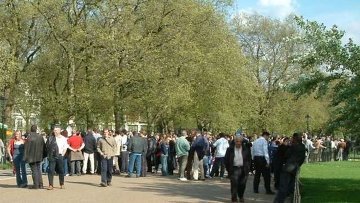MOSCOW, March 5 - RAPSI. Replicas of London's Hyde Park will open in Moscows Sokolniki and Gorky parks on May 1, according to materials from a local government meeting on Tuesday.
The sites were expected to start working on January 1, 2013, but their opening was postponed due to bureaucratic errors.
Earlier, Moscow lawmakers approved amendments to the law on rallies, allowing mass gatherings to be held at sites similar to Hyde Park Speakers Corner. There will also be two political discussion sites in Gorky Park and Sokolniki Park.
Rallies can be held here without prior approval from the authorities - an online application will suffice. Regional Security Department head Alexei Mayorov said submitting a notification to the park management will be sufficient. Special regulations for the sites have been developed, he added.
The discussion sites will have a maximum capacity of 1,500-2,000 people. The many opposition rallies held in 2012 prompted the Moscow authorities to start actively discussing the creation of Hyde Park-type spaces for citizens to express their political views.
The last opposition protest rally was held on May 6, 2012 in Bolotnaya Square in Moscow, following the election of Vladimir Putin to his third presidential term. Although authorized, the opposition march across Moscow led to clashes with the police. Dozens of protesters and police officers were injured. The police detained over 400 rally participants. After May 6, the opposition continued its protests in the form of "people's promenades," wherein crowds of opposition activists walked peacefully together through the city.
On June 5, the State Duma passed a bill increasing fines for violating rally procedures. The upper house approved it the following day. Putin then signed the bill into law.
The law has increased the fines by 10 times, stipulated compulsory community service for violators and prohibited wearing masks during protests. The maximum fine has risen to 300,000 rubles ($9,200) for individuals and 600,000 rubles ($18,400) for public officials.
The law also cracks down on unauthorized rallies by prohibiting any mass events organized under the guise of public gatherings, or so-called "people's promenades," should they cause public unrest.



